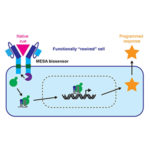 Researchers from Northwestern University have developed a method to rewire immune cells by genetically modifying the cells to sense molecules secreted by tumors and respond by activating the immune system. The team’s work is described in a study published this month in Nature Chemical Biology.
Researchers from Northwestern University have developed a method to rewire immune cells by genetically modifying the cells to sense molecules secreted by tumors and respond by activating the immune system. The team’s work is described in a study published this month in Nature Chemical Biology.
Although immunotherapy is growing in popularity among cancer researchers, tumors secrete molecules that render most immune cells inactive. “Right now, one of the most promising frontiers in cancer treatment is immunotherapy – harnessing the immune system to combat a wide range of cancers,” senior author Joshua Leonard said in prepared remarks. “The simple cell rewiring we’ve done ultimately could help overcome immunosuppression at the tumor site, one of the most intransigent barriers to making progress in this field.”
“This work is exciting because it addresses a key technical gap in the field,” first author Kelly Schwarz said. “There is great promise for using engineered cells as programmable therapies, and it is going to take technologies such as this to truly realize that goal.”
The team genetically engineered human T cells to sense a protein found in tumors called vascular endothelial growth factor. When the rewired cells detect the growth factor, they release a protein, interleukin 2, which stimulates nearby immune cells to actively respond at the site of the tumor. Unmodified T cells do not produce interleukin 2 when exposed to vascular endothelial growth factor.
So far, the team has tested their rewired cells in culture and will soon move to test it in animal studies.
“To truly accelerate the rate at which we can translate scientific insights into treatments, we need technologies that let us rapidly try out new ideas, in this case by building living cells that manifest a desired biological function,” Leonard said. “Our technology also provides a powerful new tool for fundamental research, enabling biologists to test otherwise untestable theories about how cells coordinate their functions in complex, multicellular organisms.”

